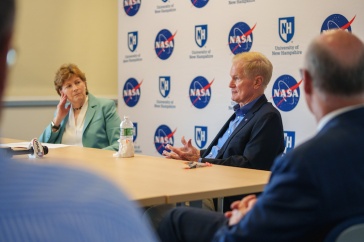
Michael Coughlan 'G24 (front row, second from left) participated in the Data Science for Social Good Fellowship this past summer.
When he’s not exploring the secrets of outer space, Michael Coughlan ‘24G is applying his skills to help humanity right here on Earth.
Taking a brief hiatus from his graduate studies in space physics this summer, Coughlan traveled to Coventry, England, where he participated in a fellowship aimed at improving the energy resilience of European homes that are currently facing soaring heating costs. The 12-week fellowship, called Data Science for Social Good, brought together 15 top-tier data science students — a mix of undergrads and graduate students — from countries all over the world who utilized machine learning techniques (a type of artificial intelligence) to help communities reduce their carbon emissions and alleviate fuel poverty.

“It was really a fantastic experience, the people I met there were amazing,” says Coughlan, who is a Ph.D. candidate in the UNH College of Engineering and Physical Sciences and the Space Science Center. “The program was aimed at attracting people like me who want to apply data science and math to improve societal problems. It was also a great opportunity to meet all types of people — it was a fairly intense program with lots of late nights working together as a group, but it was very rewarding.”
Hosted by the University of Warwick and the Alan Turing Institute, the fellowship’s participants focused on the European Union’s Energy Performance Certificates Program, which grades homes based on their energy efficiency in an effort to help the United Kingdom achieve their net zero emissions targets they’re trying to meet. Coughlan and the other fellows first had to predict the energy ratings for homes that do not currently have a grade. They then created a computer program that estimates the amount of solar power that could potentially be captured on a home, and calculate the potential load on the electrical grid if residents switched to more energy-efficient heat pumps in their houses.
Back at UNH, Coughlan’s graduate research focuses on fluctuations in the Earth’s ground magnetic fields caused by space weather storms, and he uses machine learning to predict those changes. As a self-taught computer coder, he welcomed this fellowship opportunity as a way to improve his coding skills while expanding his horizons – all for the greater good.
By the end of the fellowship, Coughlan and his cohorts presented computer models to representatives from a local council authority and a private non-profit firm, who will use them to identify priority regions where they can have the biggest impact on alleviating the high levels of fuel poverty and improving home energy resilience.
“I learned an enormous amount in this fellowship,” he says. “The UNH physics Ph.D. program prepares you for a lot, but while in England I learned different methods for machine learning that I hadn’t come across previously. I’d definitely encourage students to apply to this fellowship if they’re at all interested in these topics.”
The UNH Institute for the Study of Earth, Oceans, and Space (EOS) is UNH's largest research enterprise, comprising six centers with a focus on interdisciplinary, high-impact research on Earth and climate systems, space science, the marine environment, seafloor mapping and environmental acoustics. With approximately 100 principal investigators managing more than 400 individual grant awards, and with annual expenditures exceeding $45 million, EOS fosters an intellectual and scientific environment that advances visionary scholarship and leadership in world-class and graduate education.
-
Written By:
Rebecca Irelan | Institute for the Study of Earth, Oceans, and Space | rebecca.irelan@unh.edu | 603-862-0990
















































